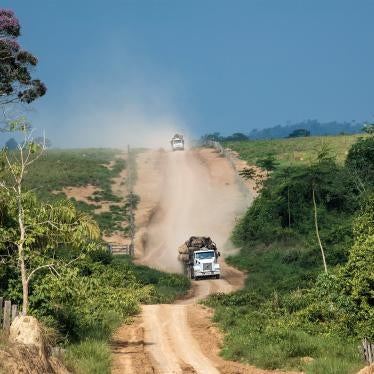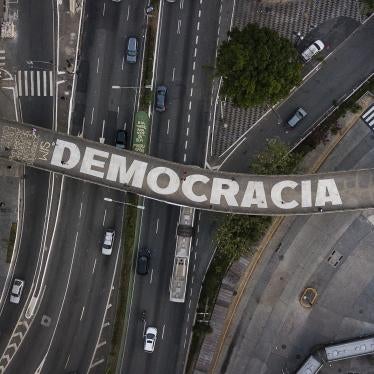Washington, DC., February 24, 2023
The Honorable John Kerry
U.S. Special Presidential Envoy for Climate
The White House
1600 Pennsylvania Avenue, N.W.
Washington, D.C. 20500
Dear Secretary Kerry:
We are writing ahead of your visit to Brazil to share Human Rights Watch’s views on how the United States can best contribute to addressing the environmental and human rights crisis in the Amazon rainforest. We are encouraged by the U.S. willingness to support Brazil’s efforts to halt deforestation and fight climate change.
We are attaching a briefing paper with recommendations to the Biden administration as well as recommendations that we urge you to address during your meetings with the Brazilian government.
As you known, President Luiz Inácio Lula da Silva took office after years of mounting environmental destruction in the Brazilian Amazon. The Bolsonaro administration sabotaged environmental law enforcement and sought to undermine the rights of Indigenous peoples and other local communities who play a vital role in forest preservation. Those measures effectively encouraged criminal networks that engage in illegal deforestation and have used threats and violence against forest defenders.
President Lula’s government has an obligation to enforce Brazilian environmental law and uphold its international human rights and climate commitments, and President Lula himself has repeatedly expressed a commitment to stem the destruction of the Amazon and protect the rights of forest peoples, including through the unprecedented creation of an Indigenous Peoples Ministry.
With support from international partners, President Lula could reverse the disastrous policies of its predecessor and effectively restore the rule of law in the Amazon and protect its people.
Sincerely,
Richard Pearshouse
Environment Director
Tamara Taraciuk
Americas Acting Director
Maria Laura Canineu
Brazil Director
Annex
Human Rights Watch Recommendations to the U.S. Special Presidential Envoy for Climate ahead of his visit to Brazil
Recommendations to the United States
Support Brazil’s efforts to protect the Amazon
- Support Brazil’s efforts to fight deforestation and fires by providing assistance, including to the Amazon Fund, directly to states and to the federal government.
- Aim through its assistance to strengthen the capacity of Brazilian authorities—including federal and state environmental agents, police, and prosecutors—to investigate environmental crime and acts of violence against forest defenders.
- Collaborate with Brazilian law enforcement authorities, through sharing of intelligence and other means, to dismantle criminal groups that are responsible for deforestation and violence against forest defenders.
- Provide assistance to strengthen protection of human rights and environmental defenders as well as protection of Indigenous territories.
- Identify possibilities, in consultation with local communities and authorities, for providing aid to support sustainable economic activities in the Amazon that provide alternatives to illegal activities.
- Support Brazil’s efforts to create transparent, traceable, and rights-respecting supply chains, particularly for those commodities most responsible for driving deforestation and environmental destruction, such as gold, beef, soy, and other agricultural products, including through the provision of technical and financial assistance.
- Support Brazilian authorities, including environmental agencies (Ibama and ICMBio), federal and state police, and the Attorney General’s Office, to identify the sale of commodities, both within Brazil and also exported to other countries, linked to environmental crimes and human rights abuses in the Amazon.
- In cooperation with Brazilian authorities, hold accountable the U.S. private entities responsible for sourcing tainted commodities from Brazil through the enforcement of the 2008 Lacey Act Amendments and Section 307 of the Tariff Act of 1930.
Adopt and enforce legislation that addresses the U.S. role in driving global deforestation
- Contribute to building bipartisan support in Congress for the adoption of the Fostering Overseas Rule of law and Environmentally Sound Trade Act (the FOREST Act), which would restrict the imports of agricultural commodities linked to illegal deforestation and violations of land rights;
- Rigorously enforce the 2008 Lacey Act Amendments that prohibit the import, transport, and acquisition of illegally harvested timber and require importers to exercise due care in order to ensure the legal origin of timber products;
- Contribute to building bipartisan support in Congress to devote appropriate resources to the US Fishery and Wildlife Service for the enforcement of the Lacey Act Amendments, including through inspections of timber imports from Brazil.
Brazil's accession to the OECD
- In line with the accession roadmap for Brazil agreed by member states of the Organisation of Economic Cooperation and Development (OECD), verify that Brazil has taken concrete measures to halt deforestation and protect environmental defenders before voting to admit the country as a permanent member state.
Recommendations to raise with the Brazilian government
Human Rights Watch urges the Special Envoy to consider raising these recommendations with his Brazilian counterparts during his trip.
Restore the rule of law in the Amazon
- Convene federal agencies –including the land-reform institute (Incra) and environmental agencies (Ibama and ICMBio)–, federal and state police, the Attorney General’s Office, and state governors to draft a plan, in consultation with local communities, to dismantle the criminal networks involved in environmental crimes and to ensure that acts of violence against forest defenders are rigorously investigated and prosecuted.
- Ensure effective enforcement of environmental laws by restoring the capacity of environmental agencies (Ibama and ICMBio) and ensure those responsible for environmental law violations are held to account, including by dealing with the backlog of unpaid fines.
- Work with governors to instruct state police to support environmental law enforcement operations and to respond promptly to acts of violence and intimidation linked to illegal deforestation and other environmental crimes.
- Work with governors to annul registries of private properties that illegally claim ownership of land within Indigenous territories and public forests and ensuring that Indigenous people are able to continue their traditional use of these lands without hindrance.
Protect human rights and environmental defenders
- Strengthen the federal Program for the Protection of Human Rights Defenders, Communicators and Environmentalists (PPDDH), including by allocating appropriate resources, training public officials; adopting clear methodologies and criteria to assess risks; ensuring defenders have prompt access to health care, psychological support, and other service; offering collective protection measures to communities at risk; and listening to local organizations and defenders about how to improve protection.
- Work with governors to create and implement state programs to protect human rights defenders where they do not exist, including by ensuring that state programs have adequate funding, training and institutional support.
- Submit the Regional Agreement on Access to Information, Public Participation, and Access to Justice in Environmental Matters of Latin American and Caribbean Countries–also known Escazu Agreement–to ratification by the National Congress.
Protect Indigenous rights
- Resume the demarcation of Indigenous lands and protect these territories from illegal land seizures and encroachment by loggers, miners and others, including by taking appropriate measures to evict those who illegally occupy or use Indigenous lands.
- Revoke the regulatory opinion adopted by the office of the Solicitor General in 2017 that prevents Indigenous peoples from obtaining legal recognition of their traditional lands if they were not physically present there on October 5, 1988 – the day Brazil’s Constitution was enacted – or if they had not initiated legal proceedings to claim it by that date.
- Strengthen the Indigenous protection agency (Funai) by ensuring adequate funding, autonomy, and qualified staff to fulfill its institutional mission.
Trace and monitor supply chain
- Revamp regulations and institute safeguards and ongoing monitoring of the supply chain for gold, cattle, and other agricultural products to ensure they are not linked to deforestation, including by implementing individual animal traceability from birth to slaughter and working with governors to increase transparency of Animal Transit Guides (GTA).
- Ensure that companies conduct human rights and environmental due diligence concerning their supply chains and business relationships, and report publicly on their due diligence policies, practices, and outcomes in accordance with international standards.
Work with Congress to protect the environment
- Work with allies in Congress to reject bills aimed at easing approval and use of dangerous pesticides that harm both biodiversity and people’s health, easing environmental licensing, arbitrarily curtailing the rights of Indigenous peoples to their territories, and effectively providing an amnesty for land-grabbing.
- Promote legislation to impose a human rights and environmental due diligence law and strict controls over the supply chain of gold, including measures to seize illegally mined gold.
Review Brazil’s climate action plan and reduce emissions
- Submit a reviewed national climate action plan (NDC) that is more ambitious than the original submission in 2016 and that is consistent with the goal of keeping global warming under 1.5 degrees Celsius. The plan should incorporate pledges under the Glasgow Declaration on Forests and the Global Methane Pledge, and include a detailed implementation strategy.








